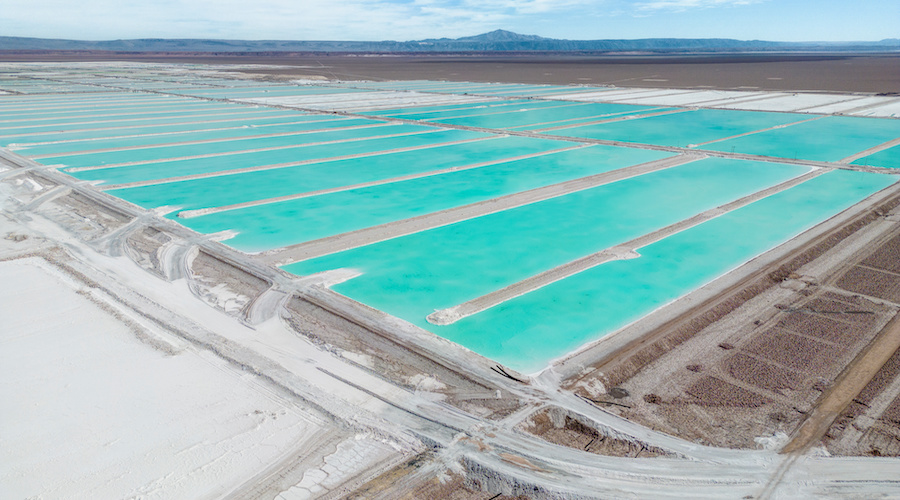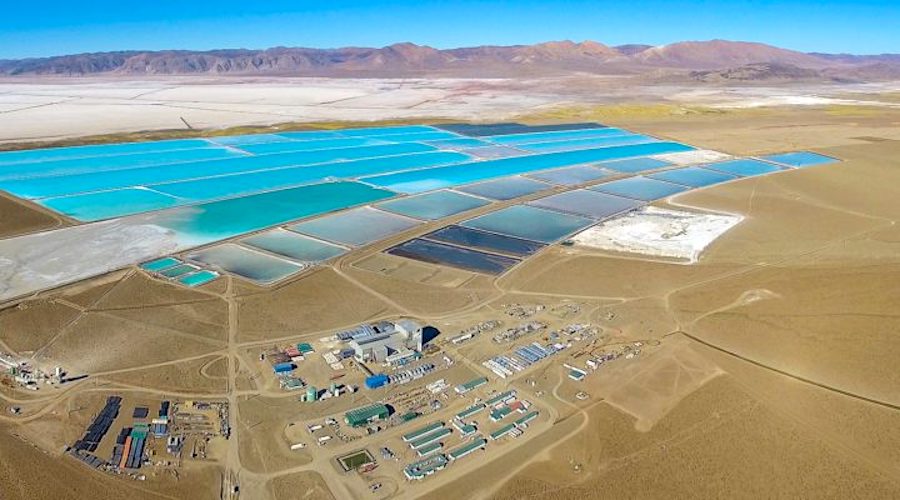Economy chief says Chile’s lithium products likely to get US subsidies
Bloomberg News | March 15, 2024 |

Lithium evaporation ponds in northern Chile. (Image by: freedom_wanted | AdobeStock.)
Chile is betting that components made with its lithium will qualify for subsidies under the US Inflation Reduction Act, potentially attracting a wave of fresh investment from companies seeking to tap into the country’s vast reserves of the battery metal.

Economy Minister Nicolas Grau, who expects talks with the Biden administration to conclude this year, said a positive decision would allow locally-manufactured lithium cathode to be built into electric vehicles that receive US subsidies.
“We’re very optimistic that it will happen,” Grau said in an interview from his office in downtown Santiago. “The way the law is framed creates the opportunity.”
As a major producer of key electric vehicle ingredients such as lithium and copper, Chile is at the forefront of the global transition to clean energy. President Gabriel Boric’s leftist administration introduced last year a national lithium policy that, while giving the state a bigger role in the sector, aims to open up new areas to mining as well as encourage more investments in plants to turn semi-processed metal into battery components.
If extended to value-added Chilean lithium, the subsidies will make it more attractive for US companies to invest in the country, said Grau, who holds a doctorate in economics from the University of Pennsylvania.
While raw materials like lithium produced in US trading allies clearly qualify for the subsidies, there is less clarity on value-added products such as cathode used in rechargeable batteries.
The US State Department did not immediately respond to a request for comment.
The Inflation Reduction Act is intended to encourage carmakers to produce more electric vehicles in North America and secure the key minerals from friendly nations with free-trade agreements, like Chile and Australia, while ensuring independence from economic rival China.
Tesla and LG
After visiting an Albemarle Corp. lithium processing facility during a trip to Chile this month, US Treasury Secretary Janet Yellen said the US is likely to increase its imports of the metal from the country.
Companies that have held meetings with the Chilean government on lithium in recent months include Tesla Inc., which started local operations this year, and LG Energy Solution Ltd.
In 2023, roughly 65% of Chile’s lithium exports went to China, while 25% went to South Korea, according to government statistics. Producers have been hit by a slump in prices last year, though Grau said analyst forecasts indicate the medium-term outlook remains bright.
The new US-Chile tax treaty, which is designed to prevent companies from being taxed twice on the same income, will facilitate investment between both nations, Grau said.
(By Matthew Malinowski and James Attwood)
Bloomberg News | March 15, 2024 |

Lithium evaporation ponds in northern Chile. (Image by: freedom_wanted | AdobeStock.)
Chile is betting that components made with its lithium will qualify for subsidies under the US Inflation Reduction Act, potentially attracting a wave of fresh investment from companies seeking to tap into the country’s vast reserves of the battery metal.

Economy Minister Nicolas Grau, who expects talks with the Biden administration to conclude this year, said a positive decision would allow locally-manufactured lithium cathode to be built into electric vehicles that receive US subsidies.
“We’re very optimistic that it will happen,” Grau said in an interview from his office in downtown Santiago. “The way the law is framed creates the opportunity.”
As a major producer of key electric vehicle ingredients such as lithium and copper, Chile is at the forefront of the global transition to clean energy. President Gabriel Boric’s leftist administration introduced last year a national lithium policy that, while giving the state a bigger role in the sector, aims to open up new areas to mining as well as encourage more investments in plants to turn semi-processed metal into battery components.
If extended to value-added Chilean lithium, the subsidies will make it more attractive for US companies to invest in the country, said Grau, who holds a doctorate in economics from the University of Pennsylvania.
While raw materials like lithium produced in US trading allies clearly qualify for the subsidies, there is less clarity on value-added products such as cathode used in rechargeable batteries.
The US State Department did not immediately respond to a request for comment.
The Inflation Reduction Act is intended to encourage carmakers to produce more electric vehicles in North America and secure the key minerals from friendly nations with free-trade agreements, like Chile and Australia, while ensuring independence from economic rival China.
Tesla and LG
After visiting an Albemarle Corp. lithium processing facility during a trip to Chile this month, US Treasury Secretary Janet Yellen said the US is likely to increase its imports of the metal from the country.
Companies that have held meetings with the Chilean government on lithium in recent months include Tesla Inc., which started local operations this year, and LG Energy Solution Ltd.
In 2023, roughly 65% of Chile’s lithium exports went to China, while 25% went to South Korea, according to government statistics. Producers have been hit by a slump in prices last year, though Grau said analyst forecasts indicate the medium-term outlook remains bright.
The new US-Chile tax treaty, which is designed to prevent companies from being taxed twice on the same income, will facilitate investment between both nations, Grau said.
(By Matthew Malinowski and James Attwood)
Bloomberg News | March 15, 2024

The Sal de Vida lithium project in Argentina. (Image courtesy of Allkem Ltd.)
The Argentine province of Catamarca said a court ruling to halt the awarding of lithium permits only affects new projects, leaving companies such as Arcadium Lithium Plc and Posco Holdings Inc. free to continue producing the metal and developing existing projects.

The ruling, which comes amid community concerns over mining’s impact on waterways, requires the Catamarca government to abstain from handing out new licenses as it prepares a report into the industry’s environmental impact, a provincial official said. The province’s first step will be to deliver to the court existing environmental reports that have already been approved.
The court’s decision, which follows a suit filed by an Indigenous group, covers the Los Patos River-Salar del Hombre Muerto area, home to some of country’s biggest lithium deposits. While four projects awaiting licenses will be affected by the permitting freeze, existing operations and projects already under development can continue as normal, the official said.
Still, the case underscores heightened environmental and social scrutiny on an extraction method that involves pumping up huge volumes of lithium-laced brine from South American salt flats, with much of the water lost in an evaporation process. The industry’s ability to prove its green credentials is crucial as demand for the battery metal accelerates in the shift toward electric vehicles.
Arcadium, formed from the merger of Livent Corp. and Allkem Ltd., declined to comment as it prepares a statement on the court ruling.
(By James Attwood)
No comments:
Post a Comment